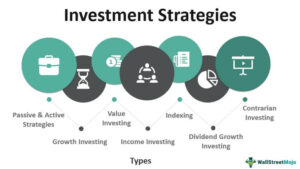Financial freedom. It’s a dream we all share, but the path to achieving it can feel overwhelming. Fear not! This comprehensive guide equips you with the knowledge and tools to navigate the world of investing, financial planning, and wealth creation. We’ll delve into the essential elements – investment strategies, market analysis, and financial planning – to empower you to make informed decisions and build a secure financial future.
Investment strategies

An investment strategy serves as your roadmap to success. It outlines your objectives, risk tolerance, and the methods you’ll employ to build your wealth. Here are some core strategies to consider:
- Growth investing: Aims to identify companies with high-growth potential. These stocks often offer lower dividends but hold the promise of significant share price appreciation.
- Value investing: Focuses on acquiring undervalued stocks trading below their intrinsic value. This strategy requires thorough research to identify companies with strong fundamentals that the market may be overlooking.
- Income investing: Prioritizes generating regular income from investments. Income investors typically target assets like bonds, dividend-paying stocks, and real estate investment trusts (REITs).
- Index investing: This passive approach involves investing in a basket of securities that mirror a specific market index. Index funds offer diversification and lower fees compared to actively managed funds.
- Dividend Reinvestment Plans (DRIPs): Allow you to automatically reinvest your dividends to purchase additional shares, accelerating your portfolio’s growth over time.
Choosing the right strategy:
The optimal strategy for you hinges on your unique circumstances and financial goals. Here’s what to consider:
- Investment horizon: Long-term investors can tolerate more risk and benefit from growth-oriented strategies. Short-term goals may require a more conservative approach.
- Risk tolerance: How comfortable are you with potential losses? Risk-averse individuals may prioritize income generation or lower-risk investments.
- Financial goals: Are you saving for retirement, a down payment on a house, or another specific goal? Your goals will influence your risk tolerance.
Market analysis

Market analysis is the cornerstone of sound investment decisions. It involves studying various factors that can influence the performance of individual stocks, entire sectors, and the overall market. Here are some key areas to analyze:
- Technical analysis: Studies historical price charts and trading patterns to identify potential entry and exit points for investments. Technical analysts use various indicators and tools to forecast future price movements.
- Fundamental analysis: Delves deeper into the financial health and future prospects of a company. Fundamental analysts consider factors like a company’s earnings, debt levels, management team, and industry trends to assess its intrinsic value.
- Economic indicators: Monitoring key economic indicators like GDP growth, unemployment rates, and inflation provides insights into the overall health of the economy and potential market movements.
- Geopolitical events: Global events and political uncertainties can significantly impact certain markets and sectors. Staying informed about geopolitical developments is crucial for investors.
Additional considerations
- Diversification: Spreading your investments across different asset classes and sectors helps mitigate risk.
- Asset allocation: This involves determining the appropriate weightings for different asset classes (stocks, bonds, cash) in your portfolio based on your risk tolerance and goals.
- Rebalancing: Periodically rebalance your portfolio to ensure your asset allocation stays aligned with your investment strategy.
Building your financial future
Financial planning is the process of creating a roadmap to achieve your financial goals. It encompasses everything from budgeting and saving to debt management and retirement planning. Here are some key aspects of financial planning:
- Setting financial goals: Define your short, medium, and long-term financial goals. This could be saving for a down payment on a house, funding your child’s education, or achieving financial independence.
- Creating a budget: Track your income and expenses to identify areas where you can cut back and save more.
- Building an emergency fund: Aim to save 3-6 months of living expenses to cover unexpected costs.
- Managing debt: Develop a plan to pay down high-interest debt like credit cards and personal loans.
- Saving for retirement: Start saving early and contribute to a retirement plan like a 401(k) or IRA to ensure a comfortable retirement.
Financial planning is an ongoing process. Regularly review your goals, adjust your strategies as needed, and seek professional financial advice when required.
Wealth creation: Putting it all together
Wealth creation is the journey of accumulating wealth over time. It’s achieved through a combination of strategies:
- Earning income: Your primary source of wealth creation is your income. Focus on increasing your income through career advancement, developing additional skills, or starting a side hustle.
- Saving and investing: Wisely allocate your savings to grow your wealth. Implement your chosen investment strategy and leverage market analysis to maximize returns.
- Living below your means: Avoid lifestyle inflation. Spend less than you earn and prioritize saving and investing.
- Making wise financial decisions: Carefully evaluate major financial decisions like taking out loans or making large purchases. Consider the long-term financial impact.
- Patience and consistency: Building wealth is a marathon, not a sprint. Be patient with your investments and remain consistent with your savings and investment plans.
Conclusion
The path to financial freedom is paved with knowledge, strategic planning, and disciplined action. This guide has equipped you with the fundamental elements of investment strategies, market analysis, and financial planning. Implementing these strategies and tailoring them to your unique circumstances unlocks the power of wealth creation and achieve your financial goals.
Disclaimer: This blog post is for informational purposes only and should not be construed as financial advice. Always consult with a qualified financial professional before making any investment decisions.

